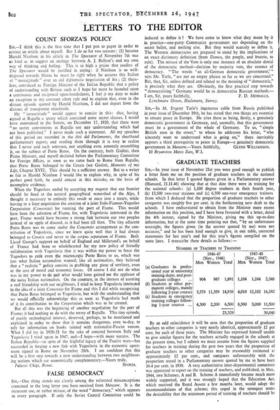LETTERS TO THE EDITOR
COUNT SFORZA'S POLICY
Sta,—I think this is the first time that I put pen to paper in order to correct an article about myself. But I do so for two reasons : (1) because Harold Nicolson in his article in The Spectator of November 7th was so kind as to suggest an analogy between A. J. Balfour's and my own way of thinking and feeling. This is so high a praise that readers of The Spectator would be justified in saying : if Nicolson is so well- disposed towards Sforza he must be right when he accuses this Italian of " inexaclitude " over an old diplomatic negotiation of his ; (2) there- fore, convinced as Foreign Minister of the Italian Republic that a policy of understanding with Britain such as I hope for must be founded upon a continuous and reciprocal open-handedness, I feel it my duty to make an exception to my constant silent rule and to explain that, even in the distant episode quoted by Harold Nicolson, I did not depart from the dictates of transparent exactitude.
My " inexactitude " would appear to consist in this : that, having signed at Rapallo a treaty which contained some secret clauses, I would have announced to the Senate, on December 17, 1920, that there were "no secret conventions at Rapallo nor any understanding which had not been published." I never made such a statement. All my speeches of this period are recorded in the Aid del Parlamento, the shorthand parliamentary report; and reading them through it is easy to realise that I never said such sentence, nor anything even remotely resembling it, on the subject of Porto Baros. On the contrary, both Giolitti, then Prime Minister, and myself declared before the Parliamentary Committee for Foreign Affairs, as soon as we came back to Rome from Rapallo, that Porto Baros belonged to the Croats (see Giolitti, Memoirs of my Life, Chapter XVII). This should be a sufficient answer. But to a writer as fair as Harold Nicolson I would like to explain why, in spite of his perfect good faith, he could concur in this mistake, on the basis of incomplete evidence.
When the Yugoslays ended by accepting my request that our frontier should be fixed at the natural geographical watershed of the Alps, I thought it necessary to embody this result at once into a treaty, while leaving to a later negotiation the creation of a joint Italo-Fiuman-Yugoslav Corporation (Consorzio) for running the port of Fiume. This would have been the salvation of Fiume, for, with Yugoslavia interested in the port, Fiume would have become a strong link between our two peoples instead of an apple of discord, as it had been till then. The tiny adjacent Porto Baros was to come under the Corporzio arrangement as the con- tribution of Yugoslavia, since we knew quite well that it had always belonged to Croatia and never to the corpus separatum of Fiume. Both Lloyd George's support on behalf of England and Millerand's on behalf of France had been so wholehearted for my new policy of friendly collaboration with Yugoslavia that it was within my power to force the Yugoslays to cede even the microscopic Porto Baros to us, which was just what Italian nationalists wanted; like all nationalists, they believed that a " realistic " policy consists in grabbing any piece of territory, even at the cost of moral and economic losses. Of course 1 did not do what was in my power to do and what would have gained me the applause of the noisy Italian nationalists. On the contrary, in the interest of assuring a real friendship with our neighbours, I tried to keep Yugoslavia interested in the idea of a joint Consorzio for Fiume and this I did while recognising that Porto Baros belonged to Yugoslavia, but with the understanding that we would officially acknowledge this as soon as Yugoslavia had made of it its contribution to the Corporation which was to be created.
But all this was the beginning of another negotiation for the port of Fiume; it had nothing to do with the treaty of Rapallo. This tiny episode, of purely archeological interest, deserved, perhaps, to be mentioned and explained in order to show that it remains dangerous, even to-day, to • rely for information on books tainted with nationalist-Fascist venom. What I did try in 1920-21 for the sake of concord between Italy and Yugoslavia I tried again in 1947, and—I hope—with more success. The Italian Republic—in spite of the frightful legacy of the Fascist wars—has succeeded in forging a new link with Yugoslavia in the economic agree- ment signed in Rome on November 28th. I am confident that this will be a first step towards a new understanding between two neighbour- ing nations which are economically complementary.—Yours truly,






























 Previous page
Previous page